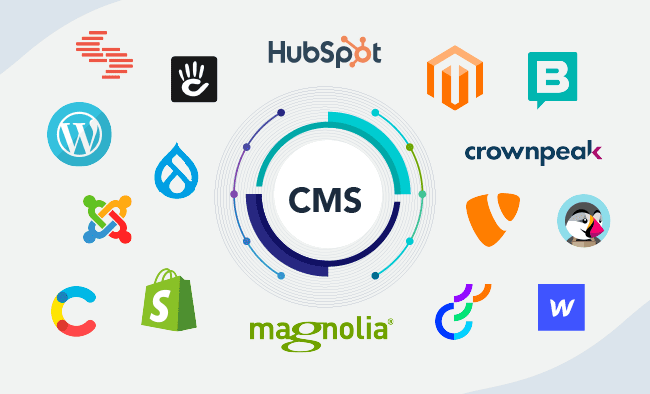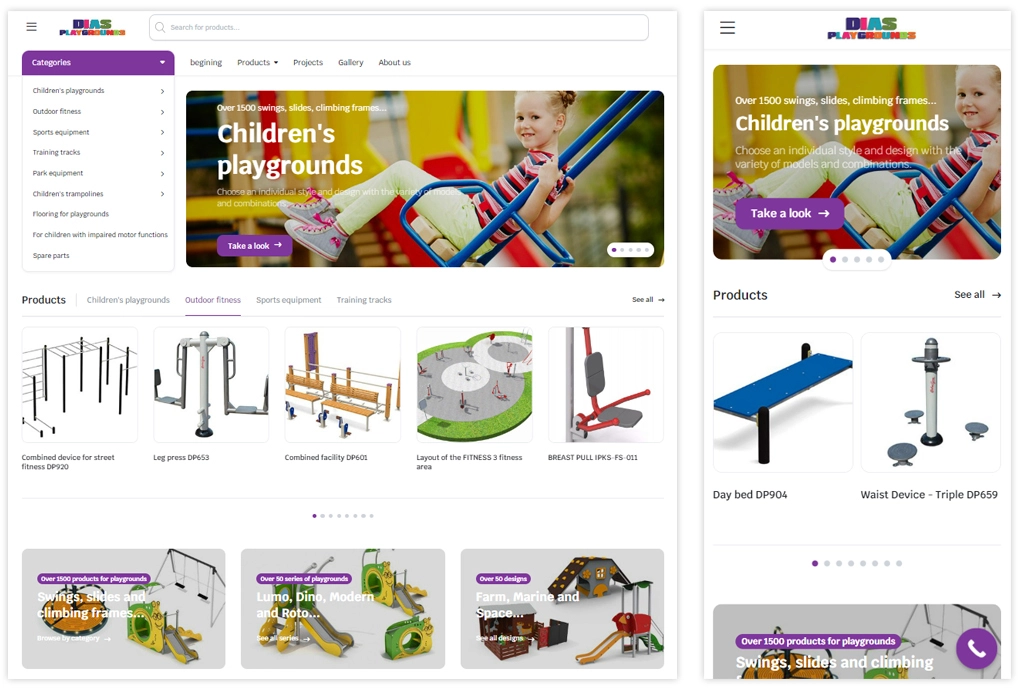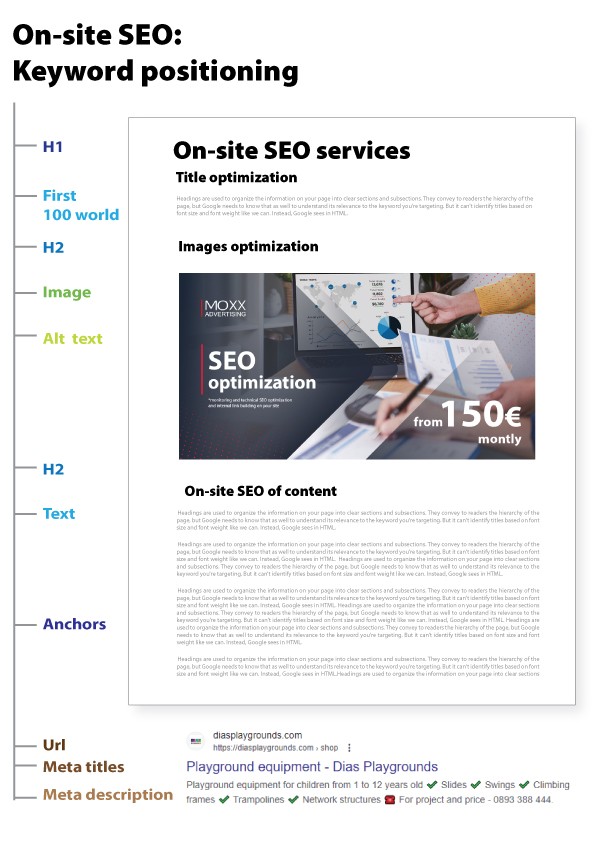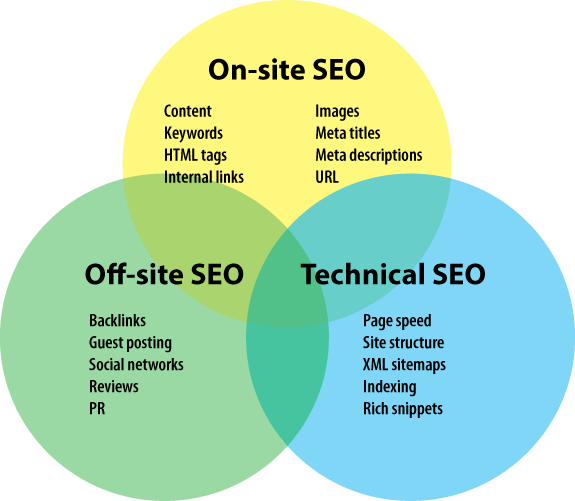Online store development
Internet services have revolutionised the ways in which we search, select products, and shop. Due to the substantial benefits for businesses in having online stores, we are witnessing the emergence of many such establishments that offer products to consumers at both local and global levels.
Why an online store?
Not only businesses, but people also love online shopping because it allows them the convenience of finding what they need from the comfort of their homes, placing an order, and having it delivered to their doorstep or the courier’s office. Every consumer can choose how they want to shop, and in this sense, the online store becomes another option in the market – a choice that you have decided to offer to your customers.
Building an online store with WordPress – first steps.
Creating an online store - first steps?
Before creating or commissioning the development of your online store, it’s essential to research and answer the following questions:
- What products or services will you offer?
- What is the volume of the products or services you will offer?
- Will you build and maintain the store yourself or rely on a professional?
- How familiar are you with the process?
- Will you sell only in a specific country or globally?
- Do you have physical stores, warehouses, or offices related to your business?
- Will you sell directly to end customers or also collaborate with other companies?
If you are offering services such as online courses, technical support, etc., with fixed prices, it qualifies as an online store since customers will request these services through the website. However, it will be a small to medium-sized online store.
If you are offering products such as fitness equipment, clothing, shoes, cosmetics, etc., it qualifies as a pure online store, which can range from medium to large.
Regarding whether you should build and maintain the store yourself or use specialists, there are several options:
- Do it all by yourself: We do not recommend this, as developing and optimising CMS systems and SEO requires intensive work and will take away valuable time that you can use to focus on your business processes, such as finding new suppliers and optimising deliveries.
- Hire a freelancer to build and maintain the online store: The advantage is that it might be cheaper. However, the drawback is that freelancers are individuals and may not be available at all times or may change frequently, leading to disruptions in the development process.
- Hire a digital agency: While this may be more expensive than hiring a freelancer, it comes with the advantage of getting a team of specialists who work cohesively. Such agencies usually have SEO experts, designers, programmers, web developers, copywriters, and marketing specialists who work in parallel, saving you time and ensuring a comprehensive service package. If your online store will operate in multiple countries, marketing agencies can also offer development and optimisation services for those markets.
Choosing a CMS Platform
Based on the answers to the above questions, you will be able to make a choice of a CMS platform for your online store. Here are some facts to help with your decision:
Advantages: The most widely used CMS platform for online stores, making it easy to find information and assistance. Easy to maintain and update. Offered as an installation by most hosting providers.
Disadvantages: For a very large product volume (150,000+), you may need to compensate with powerful hosting or consider switching the platform.
Advantages: Intuitive and very similar to WordPress from a user perspective. Easy to maintain and update. Offered as an installation by most hosting providers. Supports a considerably larger product volume than WordPress, around 500,000.
Disadvantages: Many modules may require manual adjustments. As a less commonly used platform, finding specialists for maintenance might be more challenging.
Advantages: Suitable mainly for complex and ambitious projects that require a high level of customisation and specific technical expertise. Allows management of multiple stores located in different places, operating in different languages, and with different currencies.
Disadvantages: Unlike PrestaShop or WordPress, installing Magento requires solid technical knowledge. You can choose to host Magento on a Virtual Private Server (VPS) or a dedicated server.
Check out our article ‘15 Best CMS Platforms for Building Your Online Business‘ for more information regarding your choice of an online store platform. We have specialists who work on projects using many of the mentioned platforms in the article.

Choosing a Theme and Design
The choice of a theme depends on the type of your online store, the design, colours, and features you want to implement.
Every theme can be customised according to your requirements. What you should pay attention to when selecting a theme for your online store are:
- Functionality – what possibilities and ready-made modules does it offer.
- How it appears when used on mobile devices.
- How lightweight and simplified it is to meet loading speed requirements and to be well-indexed.
The design of your online store should comply with Google’s requirements – Mobile First – meaning your design should prioritise visualisation and loading on mobile devices, and then adapt to desktop.
This might not be easy if you are just starting out, but we specialise in developing such projects for online stores.

Additional Modules
There are several essential modules you will need for your online store:
- Tracking visitor data.
- Monitoring the rankings of your online store for keywords and pages.
- SEO modules.
- Speed optimisation.
- Order forms.
- Shipping and payment modules…
Each of them serves specific functions and may require additional configurations, all of which work for the benefit of your online store. At MOXX Advertising, we have tested and worked with many of these modules. We can not only recommend which ones to use but also install, configure, and provide monthly maintenance for your online store.
For more information, check out our service on technical SEO for the success of your business or explore our guides.
Structure, Products, and Content
It is crucial for your online store to define its structure and content. The path that the user takes to complete a purchase, the information you provide, its quality, and volume—all these aspects matter. Is the content optimised for search engines? Have you established a semantic core and conducted keyword research?
There are numerous factors to consider, and that’s why conducting an SEO audit of your online store is essential. It will provide the necessary guidance on where, what, and how to place content in your online store.
Let’s draw a parallel with a physical store. If products are well-organised by type, brand, size, etc., if your sales consultants provide accurate and comprehensive information, and if you offer efficient and speedy service, the customer is more likely to return. The same principle applies to the careful planning and construction of an online store.
For more detailed information, please see our service on On-Site SEO for your business. Our blog also contains a wealth of additional information on the design, structure, and content of an online store.

SEO of online store
Whether we are creating a new online store or optimising an existing one, the process follows the same steps:
- SEO Audit
- Technical Optimisation
- On-page Optimisation
- Off-page Optimisation
These are the 4 steps through which online store optimisation goes, whether it’s a new or existing store. As mentioned earlier, we need to know ‘What… How… Where… For whom’ in order to proceed effectively.
SEO for a new online store
During the construction of a new online store, SEO in all four directions is relatively straightforward in terms of implementation, and the only time required mainly depends on:
- Volume of products – titles, meta titles, meta descriptions, features, etc.
- Volume of images – names and alt descriptions.
- Volume of additional information that needs to be written – categories, articles, and other content.
In most new projects, clients already know the products they will offer, and we have this information. However, we can also take care of the preparation and addition of this information, either through automation or manual input, depending on the project’s needs.
Attention should be paid to the following:
- Choosing a suitable hosting provider and plan.
- Selecting the appropriate platform for building the online store.
- Defining the sales niche and target audience.
- Initial investments in brand and product advertising.
Remember that the launch of the online store is just the beginning. The process of ranking, optimisation, advertising, customer retention, and acquiring new clients is ongoing and long-term. That’s why most online stores have contracts for optimisation and maintenance.
SEO for an existing online store
We always start with an analysis of the online store to identify critical points and present you with an action plan. SEO for an existing online store is done in three directions, and they overlap, so none should be neglected.

- On-site SEO refers to efforts made directly on the website, particularly on the page you are trying to optimise, such as improving its content or adding keywords.
- Off-page SEO refers to efforts made to build links to your website from other sites to help your page rank better. This includes backlinks, listings, social promotion, guest posting, PR, and more.
- Technical SEO refers to efforts that involve the website’s source code, sitemap, speed, security, structured data, and other elements that do not directly relate to the content.
The most important aspect here is not to lose any links or products. The project undergoes a series of checks and monitoring before implementing the planned changes and updates.
How much time does it take to create an online store?
The time it takes to create an online store depends…
An online store can be built as a basic framework within 2 weeks – this includes the platform, design, basic pages, menus, and categories, and it can be delivered to you as a project.
Or it can take up to 3 months, depending on the number of products, whether the process of uploading will be automated or done manually, and whether you will upload the products yourself or delegate it to us as a task.
The timeline also depends on you as the owners. Whether you will provide all the information or entrust us to write it for you.
It also depends on the investment you are willing to make to automate the process and save time, as well as whether you will listen to our advice or stick to your ideas.
We will present you with various options and possibilities, and you will make the final decision.
How much does an online store cost?
It depends…
Based on the factors mentioned above, the cost is determined by:
- The time it will take.
- The level of automation.
- Your budget.
We do not compromise on the quality of creating an online store and its optimization, but we do make compromises on the price and payment time.
If you are ready for your new online store or want optimization, please contact us for pricing and deadlines.
We create online stores for all types of businesses
We create online stores for all types of businesses, providing them with all the advantages in one of the fastest-growing industries in the world. Our service is focused on creating a secure platform that stimulates online sales and leads customers to a seamless purchase experience.
Advantages for Businesses
- A customised platform tailored to your needs, a scalable solution for your business size.
- With our tools, settings, and professional execution, you get a short time-to-market, fast page loading speed, and a mobile application.
- Starting your online business without complicating processes, easily managing your product catalogue.
- Offering multiple products to numerous buyers who are on the site, providing quick and hassle-free service.
- Rapid expansion of your online store.
Advantages for Customers
- Convenience in product selection, price comparison, and shopping.
- Choice of well-described and attractively presented products.
- Excellent prices, promotions, and sales.
- Time for researching the product.
- Options for choosing delivery methods.
- Flexible payment methods according to customer preferences.
- No stress, no crowds; just the customer and the product, ensuring the best purchase experience.




